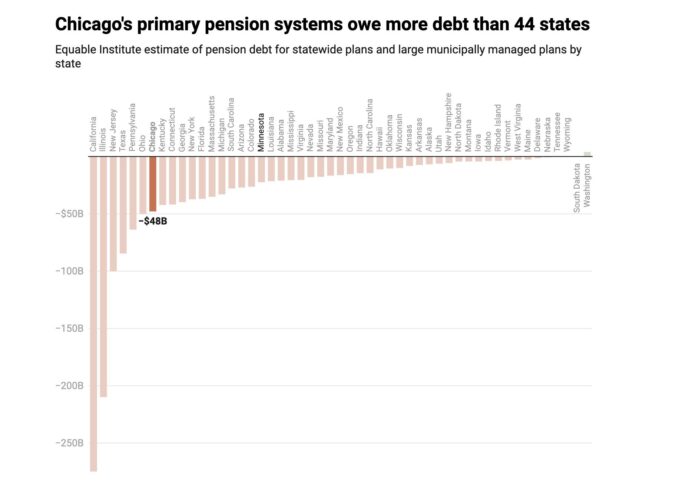Chicago’s public pension system is in dire straits. According to a report from Equable Institute, Chicago’s core public pensions, which include municipal, laborers, police, fire and the Chicago Teachers’ Pension Fund, hold more debt than 44 states with a combined pension debt of nearly $48 billion.
According to Illinois Policy Institute:
The $48 billion figure for the city’s core pension systems represents the retirement funds that are most directly paid for by Chicagoans, primarily through property taxes. More than 80% of Chicago’s property tax levy – including all of the automatic annual increase – goes to pensions, and the Chicago Teachers’ Pension Fund has its own property tax levy specifically dedicated to pensions. The city’s property tax levy doubled in a decade and shows no signs of reversing. With more debt than 44 states, only a constitutional amendment to allow for pension reform can help the city turn around its finances.
Other Chicago-area pension systems have significant shortfalls of their own. The Metropolitan Water Reclamation District has nearly $1.2 billion in pension debt. The Chicago Transit Authority’s retirement system has an additional $1.8 billion in debt. The Cook County Employees’ Annuity Benefit system holds an additional $11.8 billion in debt of its own. Together those systems have about $14.8 billion in debt, placing further strain on taxpayers in Chicago and nearby areas.
The Chicago Park District’s retirement system was not included in the Equable Institute’s data. That system has roughly $824 million in pension debt, according to its latest annual comprehensive financial report. Adding all those figures together would be over $15.6 billion and more pension debt than half of U.S. states. Those numbers reflect how deep the pension crisis remains in Chicago despite leaders hailing the city’s financial success.
Making matters worse for the city’s pension funds, each of the five major systems are also among the worst funded in the nation. According to Equable Institute’s latest data, only one local pension system in the nation has a worse funded ratio than all of Chicago’s core systems.




